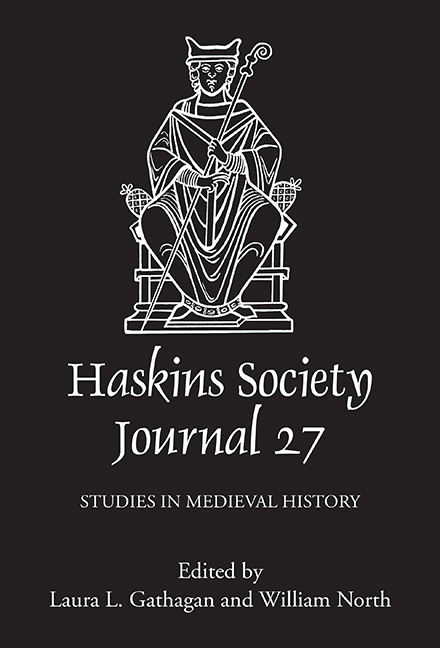Book contents
- Frontmatter
- Contents
- List of Figures
- Editors’ Note
- Abbreviations
- 1 Rural Settlement in Roman Britain and Its Significance for the Early Medieval Period
- 2 Holy Relics, Authority, and Legitimacy in Ottonian Germany and Anglo-Saxon England
- 3 Beyond the Obvious: Ælfric and the Authority of Bede
- 4 Byrhtferth’s Historia Regum and the Transformation of the Alfredian Past
- 5 Geoffrey le Bel of Anjou and Political Inheritance in the Anglo-Norman Realm
- 6 Observations on the Twelfth-century Historia of Alfred of Beverley
- 7 Helena, Constantine, and the Angevin Desire for Jerusalem
- 8 The Revolts of the Embriaco and the Fall of the County of Tripoli
- 9 Jewish Women, Christian Women, and Credit in Thirteenth-Century Catalonia
- 10 Military Entrepreneurs in the Armies of Edward I (1272–1307) of England
4 - Byrhtferth’s Historia Regum and the Transformation of the Alfredian Past
Published online by Cambridge University Press: 07 May 2022
- Frontmatter
- Contents
- List of Figures
- Editors’ Note
- Abbreviations
- 1 Rural Settlement in Roman Britain and Its Significance for the Early Medieval Period
- 2 Holy Relics, Authority, and Legitimacy in Ottonian Germany and Anglo-Saxon England
- 3 Beyond the Obvious: Ælfric and the Authority of Bede
- 4 Byrhtferth’s Historia Regum and the Transformation of the Alfredian Past
- 5 Geoffrey le Bel of Anjou and Political Inheritance in the Anglo-Norman Realm
- 6 Observations on the Twelfth-century Historia of Alfred of Beverley
- 7 Helena, Constantine, and the Angevin Desire for Jerusalem
- 8 The Revolts of the Embriaco and the Fall of the County of Tripoli
- 9 Jewish Women, Christian Women, and Credit in Thirteenth-Century Catalonia
- 10 Military Entrepreneurs in the Armies of Edward I (1272–1307) of England
Summary
In his comparison of Alfred the Great and Æthelred the Unready, Simon Keynes argued that the contrast in the two kings’ reputations developed primarily from the different types of narrative sources for their reigns. He raised the question of whether such comparisons were ever made during Æthelred's reign, especially since interest in Alfred seems to have been growing during this period. Keynes suggested in a footnote that an investigation of the use of Asser's Life of Alfred in Byrhtferth of Ramsey's Historia regum would give us some idea of Alfred's reputation during Æthelred's reign. This article takes up Keynes's suggestion, and argues that Byrhtferth's history of Alfred's reign was shaped by just such a comparison with the contemporary situation and the actions of the current king.
The Historia regum thus provides us with another example of political opinion during Æthelred's reign, to place alongside the homiletic writings of Ælfric and Wulfstan, a substantial body of royal diplomas, and vernacular literature such as the Battle of Maldon. Since the Anglo-Saxon Chronicle for this period was written after Cnut's conquest, its criticisms of Æthelred's actions against the Danes are coloured by the knowledge of their ultimate failure. These texts written during Æthelred's reign provide a contemporary perspective on his actions and reveal the wider range of opinion which Æthelred encountered.
Byrhtferth's Historia regum now forms the first part of Symeon of Durham's Historia de regibus Anglorum et Dacorum – itself often called the Historia regum – which covers folios 52r–129v of Cambridge, Corpus Christi College MS 139. The manuscript, dating from the 1160s, is a historical collection of primarily (but not exclusively) northern English interest. Since Symeon's Historia de regibus was edited by Thomas Arnold in the nineteenth century, folios 52r–75r of the manuscript have been recognized as forming a separate, probably tenth-century, composition. These folios contain a history covering the years 616 to 887, which Symeon copied, augmented, and used as the beginning of his own history, which extends to 1129. Hunter Blair's detailed analysis firmly established that the beginning of the Historia de regibus to 887 was the work of one author.
- Type
- Chapter
- Information
- The Haskins Society Journal 272015. Studies in Medieval History, pp. 55 - 78Publisher: Boydell & BrewerPrint publication year: 2016
- 13
- Cited by



